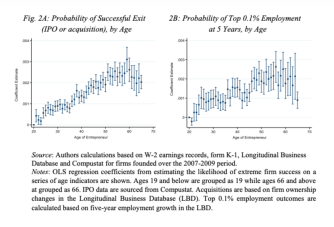More On: Zuckerbergism
'Zuckerbergism': Entrepreneurs should beware of the notion of the young founder
A recent study debunks the myth that only young individuals can come up with great new business ideas.
There’s no shortage of stories about young, hyper-successful entrepreneurs. From the Forbes’ 30 Under 30 lists to films like “The Social Network”, these tales present an attractive roadmap for early success: dream big, work hard, and you, too, will be filthy, tech-titan rich in no time.
The more usual tale is that a young entrepreneur begins a new firm, goes into debt, runs out of luck, becomes discouraged, and then reluctantly accepts a regular job. What accounts for the high number of crash-and-burn stories? The issue appears to be the age at which entrepreneurs start their enterprises, rather than the pursuit of entrepreneurship.
Most successful founders aren’t exactly young
That’s the takeaway of a recent study that found the mean age for the 1-in-1,000 fastest growing new ventures to be 45 years. This was true across "high-tech sectors, entrepreneurial centers, and successful firm exits," according to the study. So, whereas common wisdom portrays the current generation as particularly creative innovators and (pardon the pun) Big Thinkers, it appears that older generations are more likely to possess characteristics that aid business success.
"We discover that age does, in fact, predict success, and that it does so sharply," the researchers wrote. "Founders in their forties and fifties have the highest success percentages in entrepreneurship."

The essential premise of this age-success link is that people gain skills, resources, and experience as they get older. However, there were some caveats in the findings:
"Overall, we discover that younger founders appear to be at a significant disadvantage in terms of producing high-growth businesses. Nonetheless, the data suggests some intriguing age thresholds and plateaus. Founders appear to perform poorly (or, more accurately, do well only very rarely) until they reach the age of 25, at which point their performance skyrockets. Performance appears to be rather level between the ages of 25 and 35. However, success odds improve after age 35, presently overtaking those of 25-year-olds. Another significant increase in performance occurs around the age of 46 and continues until the age of 60."
To dream or not to dream?
So, what is the takeaway for aspiring entrepreneurs? It's not to give up on huge dreams. But it could be a good idea to widen your concept of entrepreneurship to include other low-cost, low-risk alternatives, such as creating out entrepreneurial chances within your existing position. That way, you'll have more experience and talents to draw on when the time comes to pursue your entrepreneurial dreams.
The data on age and success also suggest that young entrepreneurs shouldn't compare themselves to the world's outlier youthful success stories, such as the Zuckerbergs, Musks, and Gates.
“We should stop lying to young people about commerce and tell the truth that business is hard,” Jeffrey A. Tucker wrote in an article for the American Institute for Economic Research. “Work is hard. Saving money is hard. Serving customers is hard. For some people, just showing up is hard. These are all learned skills. The fun comes once you master them.”
=====













